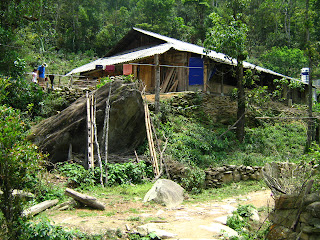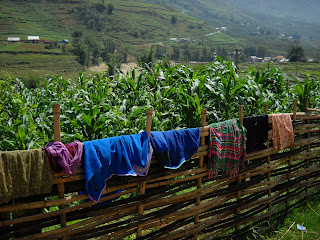 Red Zao woman with her grandchild
Red Zao woman with her grandchildMay 7th: After the night train from Hanoi to Lao Cai, and a one hour bus ride into the mountains, we arrived early in the morning on May 7th in Sapa, way in the northwest of Vietnam near the Chinese border.
 The beginning of our trek to Ta Phin, a Red Zao village
The beginning of our trek to Ta Phin, a Red Zao villageWe divided into four smaller groups and each went to a different village, where we stayed for two nights. The other three groups went to visit the Tay people in Ho village, the Black H'Mong in Sin Chau village, or the Zay people in Ta Van village.
 I remembered that Sapa was beautiful, but after traveling to so many beautiful places around the world, I had forgotten how REALLY beautiful it was.
I remembered that Sapa was beautiful, but after traveling to so many beautiful places around the world, I had forgotten how REALLY beautiful it was.

 It took us about three hours to walk to Ta Phin village, not because it was so far, but because it was so beautiful.
It took us about three hours to walk to Ta Phin village, not because it was so far, but because it was so beautiful.







 James, Michelle, Max and Adam watching the drama of a little puppy, who slipped down a rice terrace slope, and was trying to get back to her mother.
James, Michelle, Max and Adam watching the drama of a little puppy, who slipped down a rice terrace slope, and was trying to get back to her mother.
 After cleaning up, I taught my students the card game of Hearts. They immediately became addicted to the game, even playing by candle light in the evening when we lost electricity.
After cleaning up, I taught my students the card game of Hearts. They immediately became addicted to the game, even playing by candle light in the evening when we lost electricity. "Yat, ee, puhah, hop tee yew," at least that is how it sounds, which means "One, two, three, bottoms up" in the Red Zao language. After our dinner, the family ate. They invited me to join them in the drinking of rice wine, which is a traditional 'welcome drink." Next to me is Ly Phu Chieu, the homestay owner, his son Ly Lao Ta, his wife Ly Man May, their daughter Ly Ta May, and our cook Mr. Huan.
"Yat, ee, puhah, hop tee yew," at least that is how it sounds, which means "One, two, three, bottoms up" in the Red Zao language. After our dinner, the family ate. They invited me to join them in the drinking of rice wine, which is a traditional 'welcome drink." Next to me is Ly Phu Chieu, the homestay owner, his son Ly Lao Ta, his wife Ly Man May, their daughter Ly Ta May, and our cook Mr. Huan. May 8th: After breakfast we worked in the rice fields for about one and a half hours (well, some of us worked for one and a half hours - it is a very exhausting occupation).
May 8th: After breakfast we worked in the rice fields for about one and a half hours (well, some of us worked for one and a half hours - it is a very exhausting occupation). Ly Man May, the wife of the homestay owner.
Ly Man May, the wife of the homestay owner.Each morning I awoke at sunrise, around 5AM, and the homestay family was already up and working. I wonder about the future of rice growing. As Vietnam continues to modernize at a meteoric pace, and the cities show more and more signs of wealth (bicycles evolve into motorcycles which evolve into cars), rice farmers are still working for a dollar a day. The economic pressure to convert to export crops is ever increasing. Vietnam exports more rice than any country in the world (they are number two in the world behind Thailand, if you look at value, because their rice is cheaper), and even though rice is their staple food, how long will this two tier economy last?
Our local guide, Mr. Ha, told us that he grew up on a farm. He started working at age six, tending the buffalo. By ten years old he was working in the rice fields. His family moved to the city when he was 18. All farm land is still owned by the Vietnamese government. They will grant farmers 10 or 20 year leases. If you chose to leave the farm, they will grant the land to some other family.



 If you look closely, you will see a red plastic chair on top of the rice terrace. For some reason, that chair intrigued my imagination.
If you look closely, you will see a red plastic chair on top of the rice terrace. For some reason, that chair intrigued my imagination.
 There was a TV crew doing a story on tourism in Sapa, so they filmed my students on this swing with this Zay girl
There was a TV crew doing a story on tourism in Sapa, so they filmed my students on this swing with this Zay girlAfter our hour walk to Ta Van village, the van picked us up and drove us for one hour to Ho village, where all four groups met for lunch. After lunch and a dance performance by the Tay women, we walked to the waterfall.
 Swimming
SwimmingBesides the village experience, students were given a letter written by their parents about their goals and hopes and expectations for their child while on the trip to Vietnam.
Meditation before sharing:
Sometimes hearts touch from half way around the world. My wife, Christy, and I have written to each other at the same time, sharing the same thought. How does that happen? All I know is that there is so much more to reality than what I know. Also, it confirms for me my faith in the connection between all living things.
Your parents wrote you a letter, sharing their heart with you. Maybe through your reflections and journal writing, you had the opportunity to share your heart as well. One of the magical things about traveling is when two hearts meet, even when their is no common language. You have expressed this a number of times, often through that "universal language" with children and other people which you have spoken of.
I focus on my breath
The air that enters my lungs is the same air all over the world, throughout history
Everywhere humans breathing the same breath
The whole planet - one big heartbeat
Together
Your parents wrote you a letter, sharing their heart with you. Maybe through your reflections and journal writing, you had the opportunity to share your heart as well. One of the magical things about traveling is when two hearts meet, even when their is no common language. You have expressed this a number of times, often through that "universal language" with children and other people which you have spoken of.
I focus on my breath
The air that enters my lungs is the same air all over the world, throughout history
Everywhere humans breathing the same breath
The whole planet - one big heartbeat
Together
Students then shared about their village experience and their parents' letters.
Excerpts from student reflections on their parents' letter:
Excerpts from student reflections on their parents' letter:
"My parents wrote things that they wanted me to get out of the trip, but mostly it was things that they wanted to improve about themselves, or things that they never had an opportunity for themselves. I was so impressed that they spent so much energy sharing about themselves."
"It was cool how different my parents' letters were."
"I hadn't felt homesick at all, not until this letter. I opened it up and just started crying."
"Even though my mom and I look so much a like, we are so different. But this letter totally hit home."
"My parents wrote two completely different letters. And then I started thinking about the orphanage, and how those children had no parents to write them letters."
"The letter made me think about how hard it is for my mom to let go. My mom wanted me to experience these things, even though it is so hard for her, because she knew it would be best for me."
"My mom talked about when she was my age and she went to Africa. At that time she knew nothing about the culture she was going to. So I was thinking about my mom, and what she would have been like, and how her experience in Africa would have affected her."
"My mom speaks good English, but when she writes there are a lot of misspellings. But on this letter there were no misspellings. That made me realize how much effort she put into this letter."
"It was cool how different my parents' letters were."
"I hadn't felt homesick at all, not until this letter. I opened it up and just started crying."
"Even though my mom and I look so much a like, we are so different. But this letter totally hit home."
"My parents wrote two completely different letters. And then I started thinking about the orphanage, and how those children had no parents to write them letters."
"The letter made me think about how hard it is for my mom to let go. My mom wanted me to experience these things, even though it is so hard for her, because she knew it would be best for me."
"My mom talked about when she was my age and she went to Africa. At that time she knew nothing about the culture she was going to. So I was thinking about my mom, and what she would have been like, and how her experience in Africa would have affected her."
"My mom speaks good English, but when she writes there are a lot of misspellings. But on this letter there were no misspellings. That made me realize how much effort she put into this letter."



















No comments:
Post a Comment